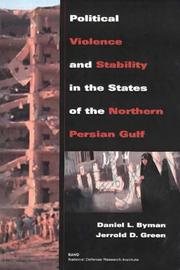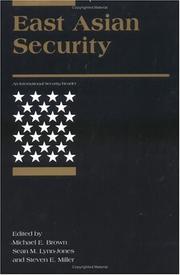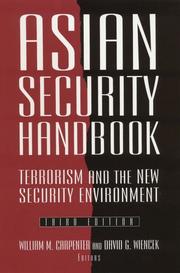| Listing 1 - 10 of 53 | << page >> |
Sort by
|
Book
ISBN: 0833083430 0833080903 9780833083432 9780833080905 Year: 2013 Publisher: [Santa Monica, CA] RAND Corporation
Abstract | Keywords | Export | Availability | Bookmark
 Loading...
Loading...Choose an application
- Reference Manager
- EndNote
- RefWorks (Direct export to RefWorks)
Political stability --- Mali --- Politics and government --- Destabilization (Political science) --- Political instability --- Stability, Political --- Consensus (Social sciences) --- Legitimacy of governments
Book

ISBN: 0691022453 0691610355 0691638489 1400858216 0691076995 1322006318 9781400858217 9780691076997 9780691022451 9780691610351 Year: 2014 Publisher: Princeton, NJ
Abstract | Keywords | Export | Availability | Bookmark
 Loading...
Loading...Choose an application
- Reference Manager
- EndNote
- RefWorks (Direct export to RefWorks)
The articles in this volume appeared first in the leading jounial World Politics. The essayists' common concern with the autonomy of the political " in the politics of developing countries contributes to the analytical unity of the volume.Originally published in 1986.The Princeton Legacy Library uses the latest print-on-demand technology to again make available previously out-of-print books from the distinguished backlist of Princeton University Press. These editions preserve the original texts of these important books while presenting them in durable paperback and hardcover editions. The goal of the Princeton Legacy Library is to vastly increase access to the rich scholarly heritage found in the thousands of books published by Princeton University Press since its founding in 1905.

ISBN: 0833043390 0585245150 9780585245157 9780833043399 9780833027269 0833027263 0833027263 Year: 1999 Publisher: Santa Monica, CA Rand
Abstract | Keywords | Export | Availability | Bookmark
 Loading...
Loading...Choose an application
- Reference Manager
- EndNote
- RefWorks (Direct export to RefWorks)
Political violence threatens the lives of U.S. soldiers and the stability of U.S. allies throughout the world. This report examines the threat of political violence in the Persian Gulf states of Saudi Arabia, Kuwait, Bahrain, and the United Arab Emirates and the best means of reducing that threat. It assesses sources of discontent, common reasons for anti-regime politicization, potential triggers of violence, and the influence of foreign powers. The report then describes the strategies that regimes in the area have used to interfere with political organization and to counter violence in general. The report concludes by noting implications of political violence for both the United States and its allies in the Gulf, and by assessing the impact of various measures that could reduce violence: enacting political and economic reforms in the Gulf; changing the U.S. presence in the region through new basing and operational approaches; increasing a European role in Gulf security; coercing foreign powers that contribute to violence; strengthening the U.S.-Gulf partnership; and improving military-to-military ties.
Political violence --- Political stability --- Destabilization (Political science) --- Political instability --- Stability, Political --- Consensus (Social sciences) --- Legitimacy of governments --- Violence --- Political crimes and offenses --- Terrorism

ISBN: 0262287048 0585330123 9780262287043 9780585330129 0262522209 Year: 1998 Publisher: Cambridge, Mass. MIT Press
Abstract | Keywords | Export | Availability | Bookmark
 Loading...
Loading...Choose an application
- Reference Manager
- EndNote
- RefWorks (Direct export to RefWorks)
National security --- Political stability --- Military & Naval Science --- Law, Politics & Government --- Armies --- Destabilization (Political science) --- Political instability --- Stability, Political --- Consensus (Social sciences) --- Legitimacy of governments --- East Asia --- Economic conditions.
Book
ISBN: 1608058344 9781608058341 Year: 2014 Publisher: Oak Park, IL
Abstract | Keywords | Export | Availability | Bookmark
 Loading...
Loading...Choose an application
- Reference Manager
- EndNote
- RefWorks (Direct export to RefWorks)
Humanitarian Crises and International Relations (1959-2013) presents a brief study of the relations between sovereign nations from 1959 to the current Afghanistan crisis (post NATO intervention). Each chapter is going to analyze a specific crisis in a chronological order. The chapters demonstrate how humanitarian crises linked to civil and military conflicts have reshaped international relations in our world today. This book is a key tool for students undertaking courses related to the history of international relations as well as human rights and on international migrations. The topics in thi
Humanitarian assistance --- Humanitarian intervention --- Political stability --- Intervention (International law) --- Humanitarian aid --- International relief --- Destabilization (Political science) --- Political instability --- Stability, Political --- Consensus (Social sciences) --- Legitimacy of governments
Book
ISBN: 1626374392 9781626374393 9781626372290 1626372292 Year: 2016 Publisher: Boulder, Colo. Lynne Rienner Publishers
Abstract | Keywords | Export | Availability | Bookmark
 Loading...
Loading...Choose an application
- Reference Manager
- EndNote
- RefWorks (Direct export to RefWorks)
The authors explore the sources of variation across African states in terms of both the susceptibility to major political and social crises and the capacity to respond to those crises effectively.
Crisis management in government --- Political stability --- Destabilization (Political science) --- Political instability --- Stability, Political --- Consensus (Social sciences) --- Legitimacy of governments --- Government crisis management --- Public administration --- Government --- Africa
Book
ISBN: 0313012598 9780313012594 0275977552 9780275977559 1280422998 9781280422997 9786610422999 6610422990 9798400631016 Year: 2002 Publisher: Westport, Conn. Praeger
Abstract | Keywords | Export | Availability | Bookmark
 Loading...
Loading...Choose an application
- Reference Manager
- EndNote
- RefWorks (Direct export to RefWorks)
Examines what external actors can do to help move a war-torn society in conflict toward a stable peace. It is based on the premise that if external actors cannot figure out how to lay a foundation for a peace, there will be decreasing support for international intervention and peacekeeping missions.
Humanitarian assistance --- Humanitarian intervention --- Peace-building --- Political stability --- Destabilization (Political science) --- Political instability --- Stability, Political --- Consensus (Social sciences) --- Legitimacy of governments --- Intervention (International law) --- Humanitarian aid --- International relief
Book
ISBN: 0773580670 9780773580671 0773503668 9780773503663 Year: 1981 Publisher: Montreal McGill-Queen's University Press
Abstract | Keywords | Export | Availability | Bookmark
 Loading...
Loading...Choose an application
- Reference Manager
- EndNote
- RefWorks (Direct export to RefWorks)
Political scientists have often assumed that communities severely divided by cleavages such as religion and ethnicity will also be unstable. The civil strife experienced by Northern Ireland seems to confirm this assumption. Yet other communities, no less divided than Northern Ireland, have maintained political stability in spite of serious tensions created by religious and ethnic differences. The Canadian province of New Brunswick is an example of such a community. In Search of Political Stability offers a detailed comparison of society and politics in New Brunswick and Northern Ireland. It reveals the fragmented nature of the two communities by comparing the distinctive cultures and separate social institutions of the major blocs, whether English or French, Protestant or Catholic. It documents the contrasting experiences of stability and instability by assessing the durability of each community's political institutions, the legitimacy and efficacy of their governments, and the prevalence or absence of civil strife. The search for the causes of stability and instability focuses on the nature of the social conflicts and the behaviour of the political elites. In New Brunswick major conflicts have cut across the division between the English and French blocs. In Northern Ireland conflicts have tended to reinforce the division between the Protestant and Catholic blocs. The effects of these differing patterns are consistent with the theory of crosscutting cleavages. An examination of the elite political cultures, including such specific elements as campaign strategies, cabinet formation, and civil service composition, shows a pattern of elite cooperation in New Brunswick and elite confrontation in Northern Ireland. These results are broadly consistent with Lijphart's theory of consociational democracy, although significant revisions are made to this theory.
Political stability --- Destabilization (Political science) --- Political instability --- Stability, Political --- Consensus (Social sciences) --- Legitimacy of governments --- History. --- New Brunswick --- Northern Ireland --- Nouveau-Brunswick --- Politics and government. --- History --- Irlande du Nord --- Politics and government --- Politique et gouvernement

ISBN: 1315289849 1315289857 1280934271 9786610934270 0765622149 9780765622143 0765615525 9780765615527 9781315289823 9781315289830 9781315289854 9780765615534 1315289830 9781280934278 6610934274 Year: 2005 Publisher: Armonk, N.Y. : M.E. Sharpe,
Abstract | Keywords | Export | Availability | Bookmark
 Loading...
Loading...Choose an application
- Reference Manager
- EndNote
- RefWorks (Direct export to RefWorks)
"This thoroughly revised and updated edition of Asian Security Handbook focuses on the new challenges to security in the Asia-Pacific region presented by international terrorism. It reviews old security realities covered in previous editions, and highlights more recent security issues in the region, including the North Korean threat, weapons of mass destruction proliferation, the South China Sea dispute, and the future U.S.-China rivalry. Featuring contributions by a distinguished group of international security and Asia experts, this new edition has been reformatted and restructured. A new introductory chapter on terrorism sets the stage for the country-by-country profiles and assessments of the political-security situations in twenty-three individual nations. A new appendix on foreign terrorist organizations is also included."--Provided by publisher.
National security --- Political stability --- Destabilization (Political science) --- Political instability --- Stability, Political --- Consensus (Social sciences) --- Legitimacy of governments --- National security policy --- NSP (National security policy) --- Security policy, National --- Economic policy --- International relations --- Military policy --- Government policy
Book
ISBN: 8024631911 9788024631912 8024634279 9788024634272 Year: 2017 Publisher: Prague Charles University in Prague, Karolinum Press
Abstract | Keywords | Export | Availability | Bookmark
 Loading...
Loading...Choose an application
- Reference Manager
- EndNote
- RefWorks (Direct export to RefWorks)
Social change --- Political stability --- Destabilization (Political science) --- Political instability --- Stability, Political --- Consensus (Social sciences) --- Legitimacy of governments --- Change, Social --- Cultural change --- Cultural transformation --- Societal change --- Socio-cultural change --- Social history --- Social evolution
| Listing 1 - 10 of 53 | << page >> |
Sort by
|

 Search
Search Feedback
Feedback About UniCat
About UniCat  Help
Help News
News